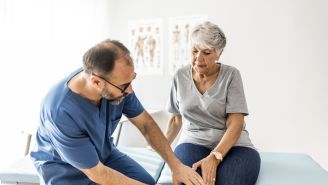How Rheumatoid Arthritis Damages the Entire Body
The autoimmune disorder attacks much more than just your joints.

It's no secret that rheumatoid arthritis (RA) affects your joints, making pain a regular part of everyday life. But the autoimmune disease doesn't stop there; it's estimated that 40 percent of people with RA have additional problems with their heart, lungs, eyes, skin and more, thanks largely to inflammation. Sometimes, the issues aren't even caused by RA itself, but by the drugs used to treat the condition.
Here are some of the most common complications reported by people with RA, and what you can do to help stave them off. (Here's a hint: Stop smoking now.)

Lung and respiratory problems
Besides joint pain, people with RA are most likely to have lung issues, which show up eight times more often than they do in normal, healthy adults. Interstitial lung disease (ILD) is the primary culprit, affecting about 10 percent of the RA population. Smokers, people diagnosed after age 60, and men are particularly prone, even though about 75 percent of people with RA are women.
Caused by scarring and inflammation, ILD is difficult to catch early, tough to treat and can impact your breathing to such a point that you may need a lung transplant. To help prevent it, health professionals suggest kicking cigarettes for good and treating the underlying RA.

Heart issues
With RA comes chronic inflammation. And with chronic inflammation often comes heart disease.
The 1.5 million Americans with RA have a greater risk of heart attack and stroke than people without RA, not to mention increased hardening of the blood vessels and more pericarditis, or irritation of the sac surrounding the heart. That's not all: Studies find they also have a much higher chance of developing blood clots, including especially dangerous clots that travel to other parts of the body.
To help combat potential heart complications, experts advocate a healthy diet, regular exercise, not smoking, and treatment. Biologic therapy has been shown to be particularly effective.

Gastrointestinal (GI) complications
In addition to your heart and lungs, RA can do a number on your digestive system. Constipation or diarrhea is fairly typical, and some with RA report bleeding, perforation (small holes), ulcers and blockage. Colon inflammation, called colitis, is another painfully familiar problem.
It's not just the disease acting here, though; medicine plays a big role in RA-related GI issues. The corticosteroids and nonsteroidal anti-inflammatory drugs (NSAIDs) used for treatment can cause stomach irritation and even bleeding ulcers. To address the pain, doctors might scale your pills back, though many also suggest—you guessed it—not smoking.

Eye trouble
People with conditions like lupus or RA often have a simultaneous autoimmune disease called Sjögren's syndrome, also linked to inflammation. As a result, their eyes and mouths feel dry. There is no cure, but it can be treated with eye drops and medication.
Another RA-related eye issue: scleritis, which causes redness, pain, irritation, vision loss and could lead to blindness if left untreated. It occurs when the sclera, the white part of your eye, becomes inflamed, and can be addressed using corticosteroids, NSAIDs, or stronger immunosuppressives.

Skin concerns
As if all this weren't enough, people with RA are more vulnerable to skin problems; serious ones can indicate more acute RA. Slower-healing wounds and nodules are common. Nodules are nubs of tissue that can appear in your lungs or under your skin, frequently near joints. They're unsightly, not usually painful, and many will go away on their own.
A more agonizing skin issue: shingles, the itchy, awful rash often found splashed across someone's face or torso. There's a 150 percent higher chance of developing shingles if you have RA, mostly since corticosteroids used to treat the disease weaken your immune system enough for the shingles virus to flare up. Antiviral drugs can help.

Wait, there's more
Rheumatoid arthritis also affects:
- Bones: Osteoporosis is a big concern of people with RA, because it primarily impacts women and is one more obstacle to movement.
- Nerves: Inflammation associated with RA can pinch or damage nerves, causing problems like carpal tunnel syndrome.
- Immunity: In addition to RA itself, the drugs used to treat the disease can weaken resistance to illness.
Good nutrition, regular exercise, more screening, physical therapy, medication and quitting smoking can help ease these conditions, and the impact of RA overall. Remember to report any unusual symptoms to your health provider, either way.
More On


video

article

slideshow


video


video
